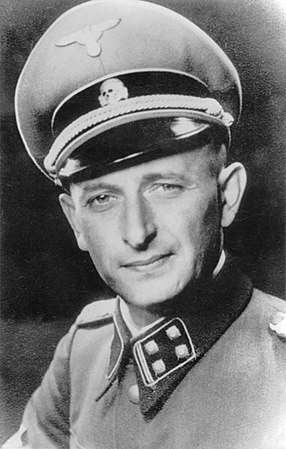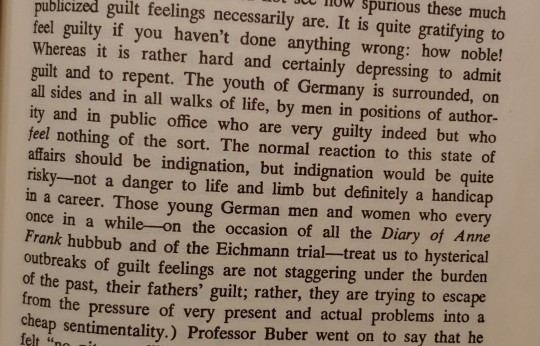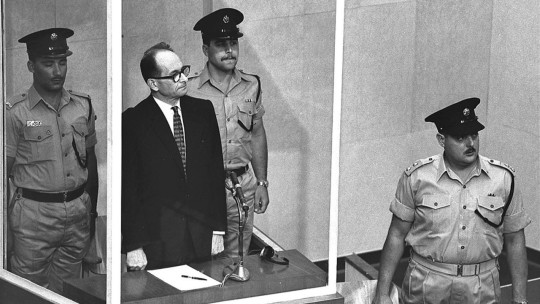#ADOLF EICHMANN
Text
“This, in a real sense, was my generation’s reaction to the Holocaust: a fearlessness born of the certainty it would never happen to us. We would be strong and self-reliant; if we went, it would be the opposite of passively. Indeed, a case can be made that we became too free of fear. Few outsiders have a full understanding of how much, even today, Israeli policy remains a visceral reaction to the specter of our loved ones being herded into the ovens.”
—Peter Z. Malkin, Eichmann In My Hands
#everyone should read this book#israel#jumblr#am yisrael chai#jewish#adolf eichmann#operation finale#oscar isaac
27 notes
·
View notes
Text
Adolf Eichmann

This is Adolf Eichmann, the empty man, timeline:
1906: He was born.
1914: The First World War began
1914: He and his family move to Linz, Austria.
1916: His mother died.
1918: The First World War ended
1925: He works in the sales division of the Upper Austrian Electrical Construction Company.
1927: He started working as a traveling salesman for the Vacuum Oil Company in Upper Austria. He left his job in 1933
1932: He enters the Austrian National Socialist (Nazi) Party and the SS at the suggestion of an acquaintance, Ernst Kaltenbrunner.
1933: Adolf Hitler is appointed Chancellor of Germany
1933: The Austrian government suppresses the Austrian Nazi Party
1933: He leaves Austria for Germany, where he joins the “Austrian Legion” and engages in military training.
1934: He joins the Security Service Main Office (Sicherheitsdienst (SD) Hauptamt) with the rank of SS-Scharführer (Sergeant).
1935: He married Veronika (Vera) Liebl.
1936: His first son, Klaus Eichmann, was born.
1937: He is assigned to a section of the SD dealing with Zionist activities.
1937: He negotiates with Zionist functionaries and makes an inspection tour of Palestine in order to assess the possibility of large-scale voluntary Jewish emigration to Palestine.
1938: The Central Office for Jewish Emigration officially opens in Vienna.
1939: He becomes responsible for promoting the expulsion of Czech Jews from the Protectorate of Bohemia and Moravia
1939: The Second World War began.
1939: He creates a Central Office for Jewish Emigration in Prague.
1939: He leads the Reich-wide Reich Central Office for Jewish Emigration in Berlin
1940: He becomes director of Reich Security Main Office (RSHA) section IV D 4 “Emigration and Evacuation”
1940: His second son, Horst Adolf Eichmann, was born.
1940: He organizes the deportation of nearly 7,000 Jews from Baden and Saarpfalz to areas of unoccupied France.
1941: He becomes director of RSHA section IV B 4 (Jewish Affairs, or Judenreferat).
1941: He is appointed SS-Obersturmbannführer (Lieutenant Colonel)
1941: He takes part in discussions in which Nazi leaders plan the annihilation of the European Jews.
1941-1942: Eichmann's Section IV B 4 coordinates the deportation of tens of thousands of Jews from the so-called Greater German Reich to ghettos and killing sites in the German-occupied Soviet Union.
1942: Reinhard Heydrich convenes the Wannsee Conference
1942: His third son, Dieter Helmut Eichmann, was born.
1942-1943: He and his aides organize the deportation of Jews from the so-called Greater German Reich, Slovakia, the Netherlands, France, Belgium, and Croatia to killing centers in German-occupied Poland, primarily Auschwitz-Birkenau.
1943-1944: He nd his aides organize the deportation of Jews from Greece, northern Italy, and Hungary, primarily to the killing center Auschwitz-Birkenau.
1944: He personally direct the deportation of Hungarian Jewry.
1945: Hitler commits suicide.
1945: The Second World War ended
1946: He escapes from US custody and flees to Argentina with the assistance of some Vatican officials.
1955: His fourth son, Ricardo Francisco Eichmann, was born.
1960: Agents of the Mossad abduct Eichmann from Argentina and bring him to Israel to stand trial.
1961: He is found guilty of crimes against the Jewish people.
1962: He died.
Sources:
Military Wiki: Adolf Eichmann
Wikipedia: Adolf Eichmann
Holocaust Encyclopedia: Adolf Eichmann
I DON'T SUPPORT NAZISM,FASCISM OR ZIONISM IN ANY WAY, THIS IS AN EDUCATIONAL POST
28 notes
·
View notes
Text
The Jews are coming: series 1 episode 1: Eichmann's execution
#ישראל#ישראלבלר#ישראלים#טמבלר ישראלי#טאמבלר ישראלי#israel#israeli#i stand with israel#pro israel#ישראבלר#עם ישראל חי#ישר#ישרבלר#jewdaism#jewish history#jewish#jewish stuff#jewblr#jew#shoa#eichmann#adolf eichmann
22 notes
·
View notes
Text
For me, our most important blog post to date.
The Eichmann Show.
A film that shows the importance of knowledge!
With an additional post showing original trial pictures and Gifs created for this topic by the wonderful @thinwhitedoc

#the Eichmann Show#martin freeman#Anthony LaPaglia#milton Fruchtman#leo Hurwitz#trial#adolf Eichmann#film#bbc
16 notes
·
View notes
Text
" Nella lettera del 1963 scritta al figlio di Eichmann, dopo il processo e la condanna a morte di suo padre in Israele, Anders, nel tentativo di andare alle radici di quella mostruosità che fu lo sterminio di sei milioni di ebrei, scrive: «L’inadeguatezza del nostro sentire non è un semplice difetto fra i tanti; non è neppure soltanto peggiore del fallimento della nostra immaginazione o della nostra percezione; essa è invece addirittura peggiore delle peggiori cose che sono già accadute; e con questo voglio dire che essa è persino peggiore dei sei milioni [di morti della Shoah]. Perché? Perché è questo fallimento che rende possibile la ripetizione di queste terribilissime cose; ciò che facilita il loro accrescersi; ciò che probabilmente rende addirittura inevitabili questa ripetizione e questo aumento. Infatti a incepparsi non sono solo i sentimenti dell'orrore, della stima o della compassione, bensì anche il sentimento della responsabilità. Per quanto possa sembrare infernale, anche per quest’ultimo valgono le medesime cose che valevano per l’immaginazione e la percezione: esso si fa tanto più debole quanto più aumenta l’effetto a cui miriamo o che abbiamo già raggiunto; diventa cioè uguale a zero. E questo significa che il nostro meccanismo d’inibizione si arresta del tutto non appena si sia superata una certa grandezza massima. E poiché vige questa regola infernale, ora il ‘mostruoso’ ha via libera» [G. Anders, Wir Eichmannsöhne, 1964].
L’esperimento nazista – non per la sua crudeltà, ma per l’irrazionalità che scaturisce dalla perfetta razionalità di un’organizzazione che cresce su se stessa al di fuori di ogni orizzonte di senso, dove, come nel caso di Stangl, “sterminare” assume il semplice significato di “lavorare” – può essere assunto come quell'evento che segna l’atto di nascita dell'età della tecnica. "
Umberto Galimberti, Il libro delle emozioni, Feltrinelli (collana Serie bianca), settembre 2021. [Libro elettronico; corsivi dell’autore]
#Umberto Galimberti#Il libro delle emozioni#filosofia#letture#Adolf Eichmann#Günther Anders#Israele#Shoah#orrore#stima#compassione#responsabilità#immaginazione#percezione#inibizione#irrazionalità#senso#Franz Stangl#età della tecnica#etica#morale#formazione#saggi#intellettuali italiani#leggere#saggistica#libri#citazioni#categorie morali#modernità
25 notes
·
View notes
Text












The file on preventing the emigration of Jews from France and Belgium, in order to accelerate the emigration of Jews from Reich territory. With translation.
Signed by Schellenberg on Mueller's behalf while the latter was absent.
This file was mentioned in Eichmann's trial(p1-p2), but in fact without obvious relation to the Madagascar Plan.
6 notes
·
View notes
Text

hannah arendt on performative guilt
56 notes
·
View notes
Text
youtube
A scene from "Conspiracy" (HBO).
#holocasut#world war II#world war two#world war#jews#jjejwish#movie#movies#film#films#history#germany#german#wannsee#Wannsee conference#wannsee konferenz#berlin#hbo#kenneth branagh#stanley tucci#adolf eichmann#eichmann#heydrich#Youtube
4 notes
·
View notes
Text
Fritz Bauer ist einer der wenigen bemerkenswerten Persönlichkeiten der BRD. Ohne ihn wäre wohl weder Eichmann der Prozess gemacht worden, noch hätte heute vor 60 Jahren der Auschwitz-Prozess begonnen.

https://x.com/diesjenesdas/status/1737438660977393706?s=46&t=UnfJHs5jrN--r9aG6DyqgQ
#fritz Bauer#auschwitz#prozesse#Deutsche Täter#nazis#eleminatorischer Antiseminismus#adolf eichmann#antifa#antifascist#fight fascism
3 notes
·
View notes
Text
Coś z Himmlera i Mengele, z Eichmanna i Heydricha jest w każdym z nas
Guido Knopp "SS przestroga historii"
2 notes
·
View notes
Text
The SS timeline

1925: The SS is formed, their Reichsfuhrer is Julius Schreck
1926: Julius Schreck left the role, Reichsfuhrer Joseph Berchtold took his place
1927: Joseph Berchtold resigned and Erhard Heide became Reichsfuhrer in his place.
1929: Heinrich Himmler succeeds Heide and is appointed Reichsfuhrer of the SS
1931: Heinrich Himmler gave the order to Reinhard Heydrich to create the SD.
1931: The RuSHA is formed.
1932: The SS already had 52,000 members.
1933: Adolf Hitler became chancellor of Germany
1933: Dachau concentration camp opened.
1933: The ''forced sterilization'' of people suffering from a series of hereditary diseases (or considered as such) begins.
1936: The SS takes control of the Gestapo.
1936: Sachsenhausen concentration camp opens its doors
1938: The Einsatzgruppen are created.
1939: Operation Himmler begins World War II.
1939: the RSHA is established by Reinhard Heydrich.
1940: The Waffen SS are created.
1940: The Auschwitz and Mauthausen concentration camps open their doors. Construction work on Gusen I begins.
1941: Birkenau becomes operational.
1942: Reinhard Heydrich holds the Wannsee Conference, which initiates the so-called ''final solution''.
1942:The first female guards arrived at Auschwitz and Majdanek from Ravensbrück.
1942: The WVHA was founded (it was responsible for managing the finances, supplies and equipment of the SS)
1944: The SS is at the height of its power: of the 1200 prominent personalities of the Third Reich, no fewer than 300 were members of the SS.
1945: Liberation of Auschwitz and other concentration camps.
1945: Heinrich Himmler is removed from office and Karl Hanke takes his place, becoming the last Reichsfuhrer of the SS.
1946: The SS are declared an illegal organization.
Sources:
Wikipedia: The SS
If you don't like it go with your life :))
I DON'T SUPPORT NAZISM, FASCISM OR ZIONISM IN ANY WAY, THIS IS JUST AN EDUCATIONAL POST
#reichblr#austrian painter#heinrich himmler#reinhard heydrich#ww2 germany#the ss#ss#holocaust#auschwitz#adolf eichmann
51 notes
·
View notes
Text







robert duvall as adolf eichmann in the man who captured eichmann
primetime emmy award nominee for outstanding lead actor in a limited series or movie
#robert duvall#adolf eichmann#the man who captured eichmann#lead actor in a limited series or movie#1997
6 notes
·
View notes
Text
Blog preview:
On Monday we will talk about the most important thing:
Remembrance!
With bonus material especially made for us.
Made by @thinwhitedoc

12 notes
·
View notes
Text
In the last sentence of her book, Arendt diagnosed the phenomenon: 'the banality of evil.'
"Humankind: A Hopeful History" - Rutger Bregman
4 notes
·
View notes
Text

«Durante el interrogatorio policial, cuando Eichmann declaró repentinamente, y con gran énfasis, que siempre había vivido en consonancia con los preceptos morales de Kant, en especial con la definición kantiana del deber, dio un primer indicio de que tenía una vaga noción de que en aquel asunto había algo más que la simple cuestión del soldado que cumple órdenes claramente criminales, tanto en su naturaleza como por la intención con que son dadas. Esta afirmación resultaba simplemente indignante, y también incomprensible, ya que la filosofía moral de Kant está tan estrechamente unida a la facultad humana de juzgar que elimina en absoluto la obediencia ciega. El policía que interrogó a Eichmann no le pidió explicaciones, pero el juez Raveh, impulsado por la curiosidad o bien por la indignación ante el hecho de que Eichmann se atreviera a invocar a Kant para justificar sus crímenes, decidió interrogar al acusado sobre este punto. Ante la general sorpresa, Eichmann dio una definición aproximadamente correcta del imperativo categórico: “Con mis palabras acerca de Kant quise decir que el principio de mi voluntad debe ser tal que pueda devenir el principio de las leyes generales” (lo cual no es de aplicar al robo y al asesinato, por ejemplo, debido a que el ladrón y el asesino no pueden desear vivir bajo un sistema jurídico que otorgue a los demás el derecho de robarles y asesinarles a ellos). A otras preguntas, Eichmann contestó añadiendo que había leído la Crítica de la razón práctica. Después explicó que desde el momento en que recibió el encargo de llevar a la práctica la Solución Final, había dejado de vivir en consonancia con los principios kantianos, que se había dado cuenta de ello, y que se había consolado pensando que había dejado de ser “dueño de sus propios actos” y que él no podía “cambiar nada”.»
Hannah Arendt: Eichmann en Jersusalén. Debolsillo, págs. 199-200. Barcelona, 2014
TGO
@bocadosdefilosofia
@dies-irae-1
#hanna arendt#eichmann en jersualén#adolf eichmann#eichmann#solución final#kant#immanuel kant#imperativo categórico#imperativo categórico formal único#teoría ética#teoría ética kantiana#ética kantiana#crítica de la razón práctica#principio de universalización#nazismo#legalidad#juicio#banalidad del mal#principios kantianos#holocausto#teo gómez otero#genocidio#filósofa
5 notes
·
View notes
Text
Whether [Eichmann] wrote his memoirs in Argentina or in Jerusalem, whether he talked to the police examiner or to the court, what he said was always the same, expressed in the same words. The longer one listened to him, the more obvious it became that his inability to speak was closely connected with an inability to think; that is, to think from the standpoint of somebody else. No communication with him was possible, not because he lied but because he was surrounded by the most reliable of all safeguards against the words of others, or even the presence of others, and hence against reality as such.
—Hannah Arendt, from "Eichmann in Jerusalem," published in the New Yorker
#quotes#hannah arendt#adolf eichmann#eichmann in jerusalem#new yorker#shoah#holocaust#banality of evil#phantasm#human rights#social justice
0 notes